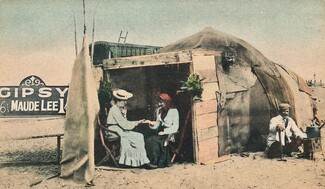Romany Gypsies and fortune-telling – by Sharon Heppell

Photograph above: Lementeni Smith and her fortune telling African Grey Parrott, on South Shore beach, Blackpool. Sharon Heppell, the author of this article, is Lementeni’s 2xgreat-granddaughter (c) Library of Birmingham/Archive Stone Collection Box 244/ Print 5
Romany Gypsy women - and very occasionally men - have practised the art of fortune-telling for centuries, if not millennia. In past times it was one of the mainstays of a family's domestic income and a tradition that was passed down by mothers to their daughters and, from time to time, their sons too.
For most fortune-tellers reading palms was an adjunct to their "calling" - going from door to door in a village or town to sell pegs, hand-made lace, small baskets, wooden flowers, sewing materials and other household essentials to the women of the house. They had to be covert about their palm reading as it had been made illegal under British legislation in 1747 and again under the Vagrancy Act of 1824.

The women earning a living in the seaside booths on South Shore, Blackpool, at the turn of the 20th Century, all had previous careers as fortune-tellers before their arrival - and they had frequently appeared in the press being arrested and tried for the crime of palmistry across Britain and Ireland. They were usually found guilty and fined but seemed to shrug it off. One or two of the repeat offenders were even sentenced to short spells of imprisonment.
Most of the fortune-tellers would ask their customers to show the palms of their hands and would then read the lines. My own 2xgreat-grandmother Lementeni Smith used that technique but also had an interesting alternative method. A photograph taken in 1906 shows her by her tent at South Shore with her pet African Grey parrot in a cage on a table, and I believe she was using the parrot to help her tell her customers' fortunes using a deck of cards.
In Blackpool, to not appear to be blatantly breaking the law, the women would put a sign up on their booth saying "Baskets for sale, 6d each. Advice free". They were, however, still prosecuted and fined virtually on a weekly basis. But telling the fortunes of Blackpool holidaymakers was extremely lucrative. "Gipsy Sarah", one of the most famous of the Blackpool fortune-tellers, used to say: "You haven't been to Blackpool unless you've had your fortune told at South Shore."
If your ancestors were members of the South Shore Romany Gypsy community, please do get in touch with me via Travellers' Times at travellerstimes@ruralmedia.co.uk.
By Sharon Heppell
This article first appeared in the Spring/Summer 2024 issue of the Travellers’ Times Magazine. You can subscribe to the next issue – which is out in November – by following this link.